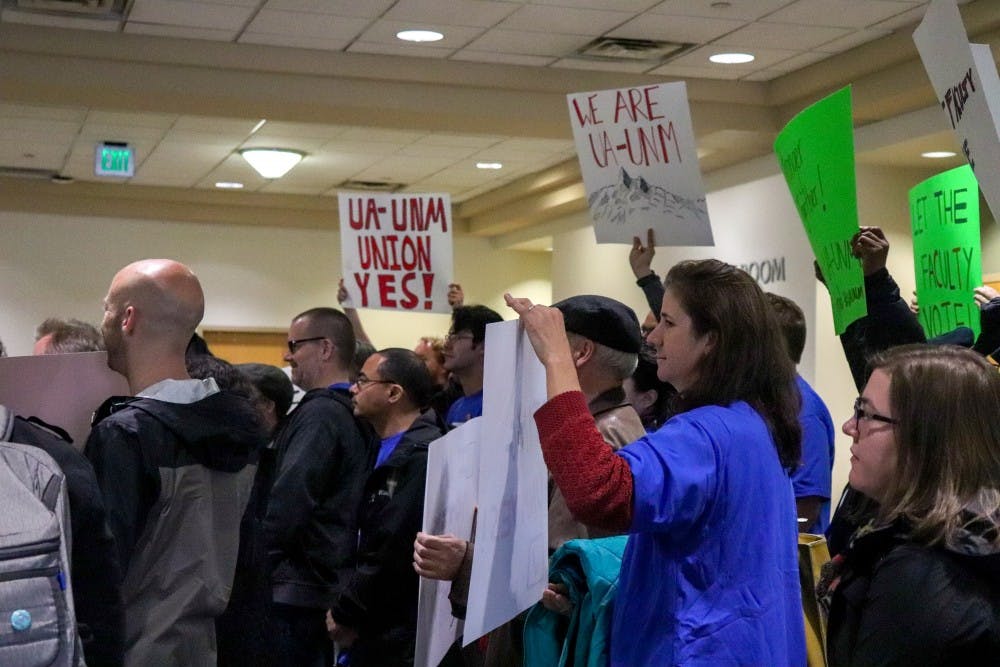Editor's Note: The University's official response submitted to the labor board can be viewed in its entirety here.
The University of New Mexico has recommended the UNM Labor Management Relations Board reject a petition signed by over 900 faculty to create a union, according to their official response submitted to the board.
UNM said the bargaining unit, United Academics of UNM (UA-UNM), was not stated appropriately and should be ordered to submit another petition with UNM’s recommended changes.
UNM’s response — delivered to the labor board Monday afternoon — was written by Loretta Martinez, chief legal counsel for UNM. President Garnett Stokes has previously said the president’s office is in charge of drafting the position. The University was required to meet a March 18 deadline for the response, which was extended from March 1.
According to the response, “UNM explicitly denies that the petitioned-for bargaining unit is appropriate.” Most of the arguments made by the University concern disputes about what type of faculty are allowed to join a collective bargaining unit.
The labor board ultimately decides who can be a part of the bargaining unit. The board consists of one representative from management (Charlotte Lamont) and one from labor (Marianne Bowers). Both Lamont and Bowers were appointed at last week’s Board of Regents meeting, and will now have to agree on a third person to serve on the board.
The response also states that department chairs should not be included in the bargaining unit, citing a labor law that dictates those in managerial and supervisory roles cannot join the unit.
“Community of interest” is a legal term that defines participation in a collective bargaining unit, taking into consideration what the interests, job requirements and work conditions are for those involved. If the labor board determines the differing faculties have little to no “community of interest,” those faculties will not be allowed to organize together.
The response gives the opinion that tenure track and non-tenure track positions at UNM “are more appropriately identified as separate bargaining units.”
When the Daily Lobo asked for the University’s position on the union following the release of the statement, a UNM spokesperson gave a URL address to a series of pages on the president’s website, not the University's official response given to the labor board.
When the webpages were first published, none of them mentioned the official response submitted by Martinez, nor any of the specific argument she makes in it.
When asked why the document was not included on the website, spokesperson Cinnamon Blair said the website went online around the same the document was filed. She did not rule out putting the document on the site in the future.
Get content from The Daily Lobo delivered to your inbox
"I don't think there's a reason we can't put it up there," Blair said.
Stokes said she believes the University has been transparent so far in the unionization process.
"I believe we have released information as it has become available," Stokes said.
The day after the cite went up, the documents were available, along with the initial petition filed by UA-UNM.
The pages include a commitment by the University to adhere to fair labor practice laws, a copy of the contract signed with labor law firm Jackson Lewis P.C., a letter from Interim Provost Richard Wood, 29 “frequently asked questions” with answers included and a link to the UA-UNM website.
A couple of the “frequently asked questions” on the website address concerns about who will be in the union, although the answers contain far less specificity than the labor board’s response.
One question reads: “Who determines whether I am in the bargaining unit or not?” The answer reads: “Both UNM and the UA-UNM will have a position as to whether you, the faculty member, are an appropriate member of the bargaining unit. The University and the UA-UNM may agree on that issue, or we may not.”
The response filed by UNM directly disagrees with the petition filed by UA-UNM on who can be in the union and that the petition is valid.
Wood’s letter, addressed to the faculty, also poses the question of whether or not the interests of different faculty are the same, and if a union “could represent the competing interests of such members.” However, the official position of the University that the petition should be dismissed is not mentioned in the letter.
Wood also offered more details on the “education campaign” Stokes had mentioned during the Feb. 28 Board of Regents meeting. It will include a variety of communications, information and public forums, so that faculty can “carefully consider the implications of unionization.”
The website also says the UNM respect the outcome of an election if faculty voted in favor of a union. However, the details regarding an election — both the timeline and if a new bargaining unit would have the numbers for a vote — are unclear.
While many universities have separate bargaining units for their full-time and part-time faculties, unions consisting of both currently exist at the University of California, Berkeley and the University of Oregon, among others.
Danielle Prokop contributed to this report.
Kyle Land is the editor-in-chief for the Daily Lobo. He can be contacted by email at editorinchief@dailylobo.com






